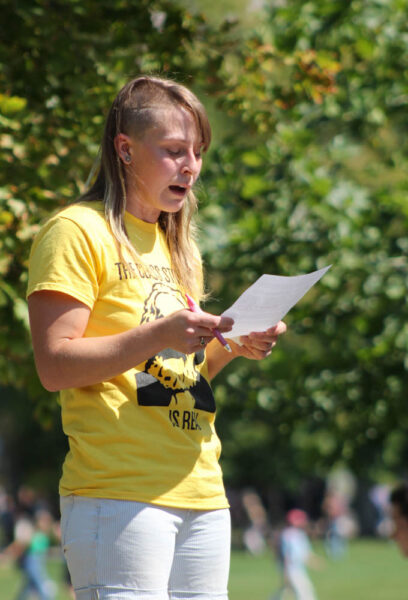Graduate students, student workers protest for liveable wages
**Editor’s Note: This story was last updated at 2:12pm on 9/12/22 to reflect more accurate information regarding Pope’s request to increase funding for graduate student assistantships.
Graduate students, student workers and other supporting Utah State University students came together at the Block A for the first rally of the school year on Sept. 8.
Close to two dozen students held up posters that read, “Our wages aren’t living. Aggie Student Labor Union,” walked around the quad once and then opened the floor for anyone who wanted to make a comment.
Students were protesting insufficient income for graduate teaching assistants, graduate instructors and student workers. Currently, wages are not enough to live off of.
“My main concern is the students who are making quite low wages,” USU Graduate Studies Senator Sarah Pope said. “We have six colleges where graduate students are making less than $12,000. That’s 113 graduate students. $12,000 is not a living wage.”
As far as student workers, protesters are hoping to increase wages to at least $14-$16 minimum.
“It needs to be raised to the point where (students) are able to pay for rent without thinking about not getting food that month,” said Joie Weaver, a second-year student at the rally.
But both Pope and the protesters are trying to stay realistic with their expectations. Pope explained her goal from the rally wasn’t necessarily for results, but more for other students to be more conscious of the issue.
“I don’t think (the rally) will change anything because that’s just not how change works at a university,” Pope said. “But I do think that it’ll bring the awareness part. There are going to be some professors and some deans that hear this and are going to be like, ‘You know, perhaps that is true; maybe we can work on this.’”
In addition to the rally, Pope said the School of Graduate Studies had requested an increase in funding for graduate student assistantships within the school of graduate studies, which she said was “denied” by USU President Noelle Cockett.
Pope said she didn’t know why the money was denied, but she plans to continue the conversation.
Her next plans are to talk to college deans to advocate for each college prioritizing their budget to pay their graduate teaching assistants and graduate instructors more.
Currently, the amount of income these graduate students make varies by college.
The College of Science pays the most to its 142 graduate teaching assistants and instructors, with an average of $18,077.97 for a nine-month salary. The Caine College of Arts pays the lowest, with a nine-month salary average of $8,481.76 for its 22 graduate teaching assistants and instructors.
But regardless of how much each college is paying, the protesters were all in agreement that none of them are offering livable wages.
“I make $14,000 a year to teach college classes, and my wife’s insurance isn’t subsidized through the school,” said Keegan Weller, a first-year graduate instructor and rally attendee. “I can’t afford to live on my stipend.”
“We deserve to be paid,” Weaver said. “I’ve been paid the minimum wage before as a college kid, and I wasn’t able to make ends meet — I was living paycheck to paycheck, and I even had someone paying for my tuition.”

Graduate Studies Senator Sarah Pope, speaks to the people who attended the protest.
And with another tuition increase this year, making it 3.5% higher than last year, circumstances aren’t getting any easier.
However, Pope said because graduate teaching assistants and instructors are typically funded through tuition and fees, a tuition increase is actually necessary to get a higher salary.
“It would be about a 1% increase to get all of the students not at $12,000, to $12,000,” Pope said. “I think what the students are wanting is for the university to prioritize these wages. Tuition is going to increase regardless, so you need to focus on the things that matter.”
No matter what the outcome is, protesters at the rally were happy to speak up for what they believe in.
“It’s good to raise your voice and make people aware of it, and then make change with it,” Weaver said. “To be able to be out here and see that people are going to Noelle Cockett and saying, ‘Hey, let’s fix this’ — it’s really cool, and good to be a part of.”
-Jacee.Caldwell@usu.edu
Photos by Paige Johnson


Many faculty members would have marched with the graduate students if we had known about the march.